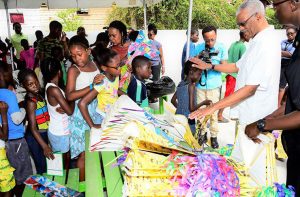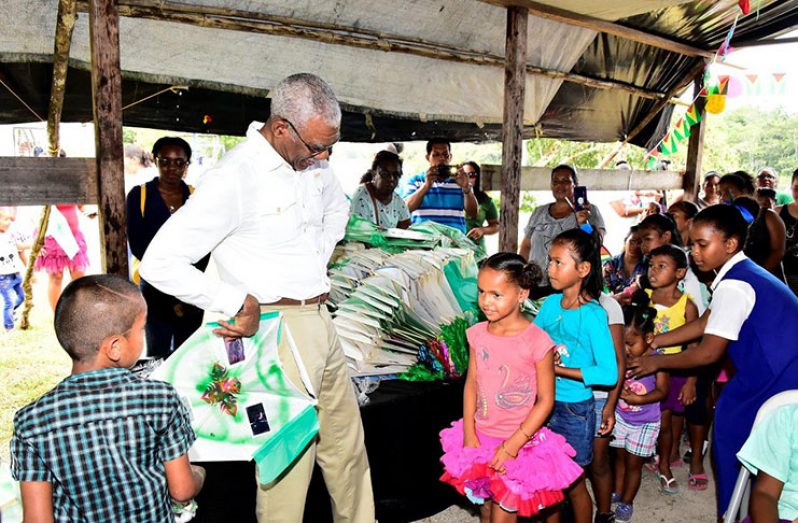Equity in the delivery of public services and access to the country’s resources continues to be a key focus of the current administration. Government has also been keen to emphasise empowerment and education as the key means of ensuring the good life for all Guyanese.
From the revival of local democracy through the hosting of Local Government elections, which allows citizens to partake in the administrative decisions governing their communities, to the introduction of several initiatives that encourage education and entrepreneurship, to the completion of several infrastructural projects throughout the country to help improve the lives of citizens, this administration continues to work to ensure that metal Guyanese have an equal stake in the nation’s development, regardless of their geographic location.
Now, as the Easter celebrations are upon us and Government has embarked on its annual countrywide kite distribution exercise, providing kites for children to partake in the festivities, President Granger has taken the opportunity to reach out to citizens to encourage them to become involved in the development of their communities and by extension, the country, through education and entrepreneurship.
The President made visits to the Pomeroon River in the Pomeroon-Supenaan (Region Two), Wakenaam, Leguan and Parika in the Essequibo Islands-West Demerara (Region Three) as well as Buxton, Lusignan and the Demerara River in the Demerara-Mahaica (Region Four). Before the end of Easter, he will visit communities in Cuyuni-Mazaruni and Mahaica-Berbice.
Access to Education
President Granger reiterated Government policy designed to transform Guyana into an ‘education nation’ as he believes that it is through education that all Guyanese can have the good life. The President’s push toward ensuring equal access to education is clearly seen through his flagship Boats, Buses, Bicycles plus Breakfast and Books (Five Bs) Initiative, which to date, has seen nine boats, 13 buses and hundreds of bicycles handed over to

children all across the country. At the kite distribution exercise at Parika, the President encouraged students to stay in school, as a sound education will allow them to access many opportunities in the future. “We believe in equality and if people are to be equal, the gateway to equality must be education,” he said.
Regional Councillor for Region Three, Ms. Kathleen Armstrong said that much effort is put into ensuring that children stay in school in the Region, and that the Regional Education Department has been working with the Regional Education Committee in this regard. “We have been doing visits to communities to ensure that all our children, who are on our register are in school and we have major shake down exercises from time to time. So I think the Regional Education Department is doing a fantastic job in ensuring every child in our Region is in school,” she said.
Youth Employment and Entrepreneurship
One of the President’s main messages as he visits these areas is his Government’s policy position on employment. During his visit to Friendship Village in the Pomeroon River, the President announced his intention to re-establish the Guyana Youth Corps on January 1, 2018; an organisation, which will seek to provide employment and other opportunities for youth, particularly those, who have dropped out of school. The President urged parents, teachers, community leaders and civil society bodies to assist the Government in identifying youth, who are in need of jobs, particularly those who may not have completed school, so that they can be enrolled in the Youth Corps when it is rolled out next year.

The President had first made this announcement in February at a graduation ceremony for the Youth Leadership Training Programme at the Madewini Training Centre. There, the President noted that due to a weakened education system over the past two decades, over 4000 children drop out of school every year in Guyana with a large percentage of students failing core subjects such as English and Mathematics at the National Grade Six level. This leaves many young people disadvantaged and unable to fully develop their potential.
The government has also pushed entrepreneurship as the key toward generating wealth and ensuring that people are able to provide an income for themselves using skills and resources that are available around them. Government’s push toward entrepreneurship can be seen in the establishment of initiatives such as the Sustainable Livelihood and Entrepreneurial Development (SLED) Initiative; the Hinterland Employment and Youth Service (HEYS) Programme; and the Linden Enterprise Network (LEN). These programmes, since their establishment, have sought to equip young people with the requisite skills, knowledge and finance needed to become entrepreneurs.
Agro-Processing
President David Granger’s vision for the country is one, which involves a sustainable economy that can be achieved, in part, through greater value-added production. Agro-processing has, therefore, remained a key part of the President’s mantra in his visits to

various communities across the country. The President reiterated this call during his visits to the islands of Leguan, Wakenaam and in Parika. The President reminded the residents of both islands of Guyana’s potential in the agricultural sector. Despite the potential for ago-processing and industry, unemployment remains high.
However, the Head of State believes that if residents tap into the agricultural opportunities and use that potential to create self-employment they can contribute to the economic development of the region and ultimately the country. He encouraged the residents to use the produce available to them and to add value to meet the demand for such products in Guyana and the Caribbean. “You can produce enough to make a good living to be rich and to provide for your children and grandchildren. I’m not saying there is no unemployment. I am saying it is possible to get good employment if you grasp education and grasp the means of employing yourself,” he said.
District Community Development Officer, Mr. Ganesh Mahipaul said that much focus is being placed on ensuring that the residents of the Region are trained in agro-processing. “The aim of the Regional Administration is to stay within the ambit of what the President wants for the country and that is a good life for all,” he said.
Minister of Business, Mr. Dominic Gaskin has said that Guyana holds great potential for agro-industrial development, given its abundance of agricultural raw materials. As such, the President’s push for persons to strengthen their agro-processing production is a good one, as it can be an effective means of economic growth and ensure an improved standard of living.
Infrastructural Development
In order for residents to function effectively in their communities, it is important that each community is equipped with basic services. These services include the required infrastructure to provide ease of access to and from the communities as well as access to health, education and other facilities that aid in improving one’s quality of living.
In the two years since this administration has taken up Office, millions of dollars have been plugged into infrastructural development in an aim to provide equal access, particularly in previously overlooked areas.

The President has said that ensuring that residents have access to these facilities is part of ensuring that Guyanese enjoy the good life. “We do not believe that your roads should be inferior, [that] your transportation should be inferior, that your schools should be inferior. That is why we are spending millions of dollars on sea defence and improving transportation on this island so that you must be able to move about, so that you must be able to get your paddy from the farms. You must be able to sell your produce in other parts of the island, the Region and the country. And we will continue working for you because every Guyanese is entitled to equal access to education, equal access to employment, equal access to good infrastructure,” he said.
Transition to Green Energy
As Guyana transitions toward a ’green’ State, much of the President’s message has been geared toward encouraging residents to convert to renewable energy. During his visit to the Pomeroon River, the President urged the residents who depend heavily on gasoline-generated electricity to look at more sustainable ways to generate energy such as solar energy. The same message was given to residents of Leguan and Wakenaam. These alternative sources of energy are easily accessible, and are cheaper than traditional forms of energy currently being used. As part of the Government’s sustainable development thrust, the President has said that the country will transition towards renewable sources of energy.
The tenets of equal access, education, green energy, agro-processing and entrepreneurship are all interlinked, and therefore remain a constant in the President’s message. The Head of State believes that once these practices are adopted, the country will be well on its way toward becoming a nation where every citizen can indeed enjoy the good life.



.jpg)








